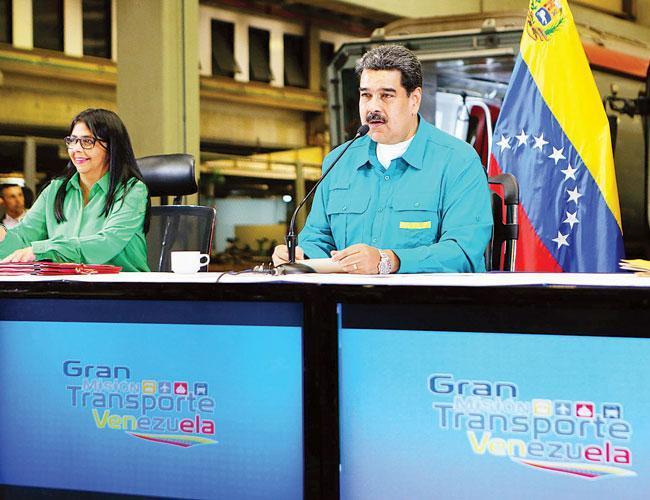
Venezuelan military officers blocked a bridge on the border with Colombia ahead of an anticipated humanitarian aid shipment from the U.S., as opposition leader Juan Guaido stepped up his challenge to President Nicolas Maduro’s authority.
Earlier on Feb. 5 the opposition-dominated National Assembly had warned the armed forces, which make up much of Maduro’s power base, not to cross a “red line” by blocking aid.
Guaido, who proclaimed himself acting president on January 23 and sparked an international crisis, claims that up to 300,000 people face death if the aid is not delivered.
Maduro, though, said humanitarian aid would be the forerunner of a U.S.-led invasion, insisting that “no one will enter, not one invading soldier.”
Venezuelan military officers used a tanker truck and huge shipping container to block access to the Tienditas Bridge, which links Cucuta, Colombia to Urena, Venezuela.
The aid delivery was being coordinated by Guaido, who has declared himself interim president of the oil-rich country and now enjoys the backing of some 40 countries as Venezuela’s legitimate leader.
Maduro, 56, has repeatedly accused the United States of fomenting a coup.
The U.S., which has not ruled out a military intervention in crisis-wracked Venezuela, was the first to recognize him as acting president, followed by a dozen Latin American countries.
In his State of the Union address on Feb. 5, President Donald Trump reaffirmed U.S. support for Guaido, saying “we stand with the Venezuelan people in their noble quest for freedom.”
Mexico’s government said on Feb. 5 it is not defending Venezuela’s President Maduro after European nations and others recognized Guaido as president.
“We don’t defend Maduro or his regime, nor are we taking a political position, we want there to be dialogue,” Foreign Minister Marcelo Ebrard said in an interview with local television.
Major European countries on Feb. 4 joined most members of the Lima Group, including Argentina, Brazil and Canada, supporting Guaido as interim Venezuelan leader and calling for free elections.
Venezuela’s opposition-dominated congress on Feb. 5 said it will hold new elections as soon as possible within a year- once embattled President Maduro is ousted from power.
Meanwhile, Venezuela’s socialist party boss, Diosdado Cabello, threatened to hold early legislative elections that could gut the congress, which is the only branch of government controlled by the opposition. He accused the opposition of taking orders from the United States.